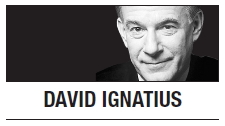WASHINGTON ― John Maynard Keynes once said that words should be used aggressively, “for they are the assault of thoughts on the unthinking.” That’s a starting point for an appreciation of Mervyn King, who will retire soon as governor of the Bank of England and who has displayed the quirky intellectual passion of Keynes himself.
Like Keynes, King is a theoretical economist who turned to public policy. He helped guide the British central bank for the past 22 years, first as chief economist, then deputy governor, and for the past 10 years governor. He’s one of those mild-mannered Englishmen who can dominate a room the moment he begins to speak, with a wry humor that can amuse, charm and eviscerate at will. I can’t pretend to be objective; King is my former economics professor and longtime friend.

King was in Washington last week for his last round of meetings of the World Bank and International Monetary Fund. A sign of his influence was a dinner in his honor at the British Embassy that included four current or former Treasury secretaries, three central bank governors, two top IMF officials and the chancellor of the exchequer.
King sat for a final interview in which he discussed the financial earthquake that has shaken economics over the past decade. In a remarkable admission for a central banker, he said events have shown that “purely monetary stimulus will not be enough. ... Monetary policy is pushing on a string. It has some effect, but less than we might have thought.”
King has a reputation in Britain as a hyperprofessional economist, and by his own account his first 15 years at the bank were spent creating a rigorous “inflation rule” for monetary policy and hiring top economists to implement it. Good monetary policy helped encourage a decade of expansion and low inflation, which King once described as “the nice years.” When the crisis hit in 2008, King’s first instinct was to leave his professional structure in place and ride out the storm.
The second part of King’s tenure saw creative and painful adjustment to the crisis. For all King’s work to develop rigorous economic tools, the public could plainly see that they hadn’t worked.
As King struggled with the crisis, he concluded that the biggest vulnerability was the solvency of the banking system itself. The crash wasn’t just a liquidity squeeze caused by toxic assets; the problem was that big banks around the world were undercapitalized and, in many cases, insolvent.
To deal with this solvency crisis, King pushed the banks to recapitalize and, later, to accept more regulation. This upset a financial elite that, as King says, was the only sector of the British economy that had escaped the market revolution of the Margaret Thatcher years. The lords of finance waged a losing battle against King’s tougher standards.
For King, the past decade reinforced the lessons Keynes drew from the 1930s: One is the psychological quirkiness of investors, which Keynes described as “animal spirits” on the upside and “extreme liquidity preference” on the down. Then and now, monetary policy could not convince frightened people to spend and invest. As a result, the Western economies in 2013 remain stuck at high unemployment and low output levels.
The second Keynesian lesson was the need for some international structure to balance surplus and deficit nations. Keynes’ framework was the Bretton Woods system of the World Bank and IMF. Those global institutions are weak, but the real crisis has been within the eurozone, which has no effective internal balancing mechanism: It lacks a federal structure to transfer money from surplus Germany to deficit Greece, and it lacks flexible internal exchange rates that could allow a Greece or Spain to devalue its currency and find its own equilibrium.
Europe has responded to the crisis with the very British approach of muddling through, but King predicts it won’t work. Creating a true federal union, while an admirable goal, will be the work of a hundred years; the only quick way for countries to adjust is the breakup of the eurozone. King thinks the eurozone must confront the basic choice between accepting a transfer union or changing the membership of the existing monetary union. “Muddling through” isn’t a serious option.
Keynes’ gift was to look beyond the technical questions of economics to the big issues. That’s what the sharp-witted King has tried to do, too. Suffice it to say that he’s the only person I’ve ever seen who could intellectually intimidate former Treasury Secretary Larry Summers. King couldn’t fix the British economy, but he did understand it.
By David Ignatius
David Ignatius’ email address is davidignatius@washpost.com. ― Ed.
(Washington Post Writers Group)








